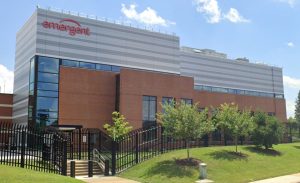Emergent BioSolutions is at the frontline of COVID-19, supporting vaccine candidate production for AstraZeneca, J&J, and others. Head of Emergent’s CDMO business explains why.
Before January, the biologics contract development and manufacturing organization (CDMO) landscape was “very, very exciting,” Syed Husain, senior vice president and CDMO business unit head at Emergent, tells Bioprocess Insider over a Zoom interview. On the drug substance side, there was a healthy amount of demand for capacity coming from industry with a lot of opportunities for CDMOs to contribute.
But then COVID-19, caused by the novel coronavirus (SARS-CoV-2), arrived. The rush was on to develop vaccines and therapeutics and as candidates entered the clinic at unprecedented speed, the need for large-scale manufacturing was realized.

Emergent’s drug substance facility in Bayview, Baltimore, MD. Image: Google
“The COVID pandemic casts a pretty critical spotlight on the role of CDMOs,” says Husain, “not only for capacity, but for the type of capability and expertise that’s needed to produce vaccines.” But even within the availability of CDMO space, the pandemic has shown that industry does not “have the right type of capacity available at the right time.”
In recent months, Emergent has announced a string of CDMO deals with COVID-19 vaccine developers, including Vaxart, Novavax, J&J, and AstraZeneca – the deal with the latter, the firm said this week, has been expanded and is worth $261 million.
Pandemic-ready manufacturing
According to Husain, Emergent’s experience in making anti-infectious disease vaccine for commercial use – Emergent has its own portfolio including FDA approved vaccines BioThrax (Anthrax Vaccine Adsorbed) and Vaxchora (Cholera Vaccine, Live, Oral) – and pandemic-ready manufacturing network are major factors in winning so much COVID-19 work.
The Bayview drug substance facility in Baltimore, Maryland was designed and built in partnership with the US government specifically with the intention to respond to a pandemic.
“It’s a multi-suite set-up that can produce tens to hundreds of millions,” says Husain. “As a part of the original design that Emergent initiated and then collaborated with the government on was to design a facility that could be prepared for a pandemic response, but subsequently also, be a very significant contributor in the biologics drug substance manufacturing space.”
The facility, a Center for Innovation in Advanced Development and Manufacturing (CIADM), is equipped with single-use bioreactor systems of up to 4,000 L, supplied by ABEC. “We were kind of one of the companies at the forefront of [large-scale single-use manufacturing],” says Husain.
“We felt that there were a lot of benefits from a standpoint of getting drug substance out the door,” he continues, adding that single-use provides flexibility, rapid changeover, and “drastically reduces the risk of any type of cross contamination,” all key factors in making vaccines for a pandemic.
“There’s folks out there with stainless steel, there’s folks out there with much larger scale. But in our opinion, when you look at kind of the progression of what the market needs, this up to 4,000 L capacity – or predominantly 2,000 L capacity – is a sweet spot right now because you can support clinical manufacturing but also get into commercial manufacturing as well.”
And similarly on the drug product side, a partnership with the Biomedical Advanced Research and Development Authority (BARDA) – part of the Department of Health & Human Services (HHS), BARDA – has led to several expansions at Emergent’s fill/finish sites in Camden and Rockville, Maryland, both contracted to support COVID-19 projects.
In-country manufacture
That partnership with BARDA, inked in 2012, has been further cemented in recent weeks with Emergent being awarded $628 million through Operation Warp Speed to help efforts in producing and supplying potential COVID-19 vaccines, therapeutics, and diagnostics.
Operation Warp Speed is focused on procuring these products for the US, with an ‘in-country manufacturing’ approach. While this appears to be a protectionist or patriotic policy, Husain points out the practical side of keeping manufacture within a country for a pandemic like COVID-19.
“It’s really dependent on the ability to rapidly deploy those doses. The closer you are to [the manufacture] even with all the enhancements and modernizations of supply chains and distribution networks, the more confidence you have and the more direct availability that you have as well.”
